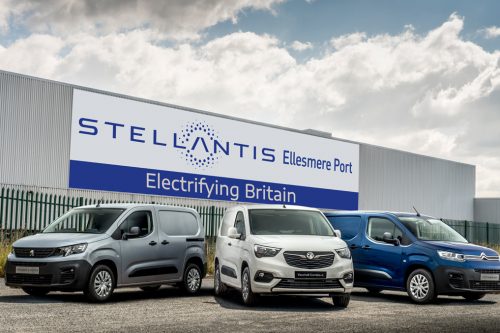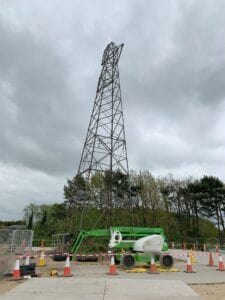Stellantis guarantees future of Ellesmere Port site through production of electric vans

Motor giant Stellantis guaranteed the future of its Ellesmere Port manufacturing site today with confirmation that it will make new electric vans and passenger versions from 2022.
The announcement will secure around 1,100 jobs at the Cheshire plant, as well as thousands more in the motor industry supply chain.
Stellantis said it will manufacture a range of eight electric vans, from delivery vehicles to their passenger derivatives, from the end of next year as part of a £100m investment. The Government has reportedly contributed £30m.
The plant will also build vehicles under a range of marques held by Stellantis, including Vauxhall, Citroën, Peugeot and Opel.
The former Vauxhall plant, previously owned by US giant General Motors, has been known as the ‘home of the Astra’, the popular model produced there since 1980 for sale in the UK and across Europe under the Opel badge.
But the current model will be the last to roll off production lines following Prime Minister Boris Johnson’s ruling that the sale of petrol and diesel-driven vehicles will be banned in the UK from 2030.
Arnaud Deboeuf, Stellantis chief manufacturing officer, said Ellesmere Port will be the group’s first site to be transformed to production of battery-powered vehicles.
He praised the plant’s staff for their “remarkable mind-set and flexibility during the past few months”, adding “they are the ones who will be at the heart of the success of this transformation.”
He hailed a “new era of all-electric vehicle manufacturing and a sustainable future” for the site.
Business Secretary, Kwasi Kwarteng, echoed his praise of staff, saying: “I would like to thank the workforce and the unions for their role, and the local authorities.

Kwasi Kwarteng
“I am very pleased the Government, and myself, have been very engaged and concerned to drive progress here.”
He added: “Stellantis, as we all know, is deeply committed to the UK and this £100m investment is a great development. I think this all-battery electric vehicle facility, the first that Stellantis has in the world, will actually be a beacon of how automotive manufacturing can be done in the UK and it underlines the fact that automotive manufacturing, the automotive industry, is at the front and centre of our manufacturing offer as a country.
“I am looking forward to many decades to come in which this site will be a world- beater.”
Prime Minister Boris Johnson also welcomed the investment in Ellesmere Port through a televised statement broadcast to the plant, in which he said: “It’s a huge vote of confidence in our economy and the people of Ellesmere Port.”
In a statement, Stellantis chief executive, Carlos Tavares, said: “Performance is always the trigger for sustainability and this £100m investment demonstrates our commitment to the UK and to Ellesmere Port. I particularly want to thank our highly-skilled, dedicated workforce for their patience and contribution; we never let them down.
“Equally, I want to thank our partners the Unite Union for their open mind-set and strong cooperation and, of course, the UK Government for their continued support. Producing battery electric vehicles here will support clean, safe and affordable mobility for the citizens. Since 1903 Vauxhall has manufactured vehicles in Britain and we will continue to do so.”
Unite the Union general secretary Len McCluskey said: “This is a great day and one that gives Ellesmere Port’s world class workforce the bright future they deserve.
“Unite has battled for years to secure the future of this site. Our members have been unfailing in their efforts, and I have lobbied Stellantis’s CEO Carlos Tavares and the top levels of government personally on numerous occasions.
“At times the uncertainly has been unbearable but these plans have ended that, with Ellesmere Port’s workers now set to proudly play a leading role in the UK’s green transport revolution.”
The £100m investment involves a new body shop for the site, and a promise of further investment for the creation of a new UK parts distribution centre.
Council and business leaders welcomed Stellantis’s commitment to the future of Ellesmere Port
Business and political leaders across Cheshire have hailed the news of a new era for automotive manufacturing at Ellesmere Port, as a significant boost for the entire region.
Cheshire West and Chester Council has been working with Cheshire and Warrington Local Enterprise Partnership to offer a strong support package for the site. The local investment package has been described as ‘invaluable’ by bosses at the car plant.

Cllr Louise Gittins
Cllr Louise Gittins, leader of Cheshire West and Chester Council, said: “We are delighted at the decision reached by Stellantis to invest in the future of low carbon vehicles at its plant here in Ellesmere Port.
“After a period of uncertainty about the future of the site, this is welcome news, not just for Ellesmere Port, but for the entire region.
“Today’s announcement comes as a result of detailed discussions behind the scenes by the company, government officials, the council and its local partners including Cheshire College South and West. The fact that Stellantis has committed to continue to invest in Ellesmere Port and safeguard hundreds of jobs comes at a time when our borough really needs it.”
She added: “We are particularly excited that Stellantis is committing to producing electric vehicles at the plant, which will secure jobs in the region up to and beyond 2030. This forms part of Ellesmere Port’s critical transition from one of the UK’s largest carbon footprints, to an international centre of innovation and manufacturing within the low carbon economy.
“It is clear that our borough has an exciting future ahead of it. We are beginning to lead the way when it comes to renewable energy and green technology.”
Clare Hayward, chair of the Cheshire and Warrington Local Enterprise Partnership, said: “Vauxhall Ellesmere Port has been a mainstay of our region’s industrial landscape since 1962 and its skilled and flexible workforce has been proven time and again to be among the best in the automotive sector.
“We are, therefore, delighted to welcome this news, which safeguards the long term future of the plant. Investing in the industries of the future including EV technology is essential to Cheshire and Warrington’s future as we establish ourselves as a world leader in the low carbon economy Stellantis’s investment is, therefore, both timely and prescient and will have a catalytic impact across our region.
“We are particularly pleased that we have been able to develop a package of energy investments in the plant to help achieve net zero carbon by 2030.“
Stellantis has been locked in talks with the Government, and Business Secretary Kwasi Kwarteng, since the beginning of the year over state aid to guarantee the future of the site following a switch to electric vehicle manufacturing.
Last month Alison Jones, Stellantis UK group managing director, announced that government funding for electric vehicles, and in particular, UK-based battery production, was key to the future of the Vauxhall plant.
She said: “The cost of manufacturing has practical components to it, energy being one of them. So when we’re considering what it takes to manufacture in the UK compared to other countries we have to assess the costs.
“So the discussion with government is, OK, how do we make our manufacturing base relevant and able to be done within the UK when you are competing effectively with other countries for that investment?”
She added: “We are part of Europe, geographically, we are a large market within Europe, so we should absolutely be considering asking our government to consider really pushing forward for that investment they spoke about an industrial strategy to end sale of combustion engines by 2030 and plug in hybrids by 2035.
“So contribute. Contribute in terms of that investment we need. You can’t just say it, you have to work out the investment required.
“We have been really clear, to be able to move to electric and plug-in hybrid vehicles we need the technology, the infrastructure for customers to be able to charge their vehicles, you need the energy companies to work on making that readily available.
“And then you need consumer behaviour, and where the Government comes in is to to influence with investment, and driving consumer behaviour.”








